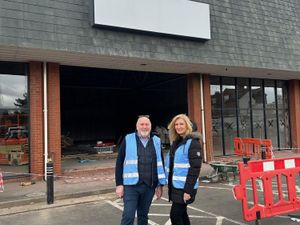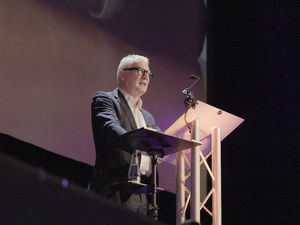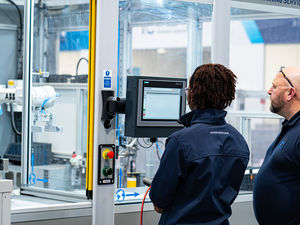Chancellor is criticised for lack of cuts on fuel
Business in the West Midlands today welcomed George Osborne's tax cuts - but criticised the Chancellor for a lack of action to tackle high fuel costs and spoke of their concern at the region's worrying skills gap.
Business in the West Midlands today welcomed George Osborne's tax cuts - but criticised the Chancellor for a lack of action to tackle high fuel costs and spoke of their concern at the region's worrying skills gap.
At Wolverhampton-based concrete and quarries group Tarmac, chief executive Terry Last said: "This year's Budget is good in parts. Plans for further investment in national infrastructure and housebuilding are a step in the right direction, and moves to rebalance the tax system for individuals and business are also helpful."
But he added: "More needs to be done to help businesses, particularly in the hard-hit construction sector, now."
At the Birmingham office of accountants BDO, partner and head of tax Richard Rose said the increase in the personal allowance to £9,205 in 2013/14, would lift an additional 74,000 people in the West Midlands out of income tax."
But Johnathan Dudley, Midlands managing partner at national audit, tax and advisory firm Crowe Clark Whitehill at Oldbury, described the Budget as less Wallace & Gromit – the Chancellor's analogy when extending film tax credits to the digital and animation sectors – and more Robin Hood.
"He has taken from the rich to give to the poor while squeezing the middle," said Mr Dudley. "And, if it was supposed to be a Budget for business, it is hard to see that it has done a lot."
Mr Dudley said that while reducing the 50 per cent income tax rate to 45 per cent the Chancellor had done nothing for those earning around £100,000, the point where personal allowances are withdrawn, who as a result pay an effective 60 per cent, a level where many more people were caught in the net.
But he welcomed the cut in corporation tax.
Mark Nunan, chairman of Walsall manufacturing firm BSC, said: "Whilst a tangible investment strategy to boost British manufacturing is still sadly lacking from this government, the overriding message I took from the budget is that Britain is a place to do business.
"The confident, almost triumphant manner in which the budget was delivered told the world that we may have a budget deficit but we are still alive and kicking. And, in many ways, it is confidence that is the single most important factor for business; we need consumers that are confident about their economic future, we need companies believing that the UK is a place to do business and we need a government that is confident about the ability of the corporate world to deliver growth and jobs.
"There were some welcome simplifications and some tax reductions but these small changes will not make companies invest and entrepreneurs take the risk of going it alone – they also need confidence, and the budget seemed to go a long way towards giving us that."
But there was short shrift today for Chancellor George Osborne over his lack of action over fuel duty.
Steve Salt, of Essington-based delivery group APC Overnight, said: "We are disappointed that the Government is going ahead with the autumn 3.02p increase in fuel duty, but not surprised. It goes to the heart of industry, not just the transport sector. Every company that makes something has to move it about, so increasing fuel costs will hit everyone in the end."
John Rider, West Midlands chairman of the Institute of Directors, was also critical of the Government's failure to reduce petrol prices. "It is disappointing that petrol is to rise again – it affects demand in the economy. People have to get to work so they will cut back on other things. Business has to factor in transportation costs. Petrol price rises hurt and act as a drag on the recovery."
But he said it was right that the Chancellor should clamp down on abuse of the tax system. "Whoever it is, rich or poor, should expect to take the consequences."
An unimpressed Black Country Chamber of Commerce says the Chancellor has missed his opportunity to stimulate business investment and economic. President Mike Dell said: "The Chancellor could have addressed a number of major concerns for business including scrapping the 5.6 per cent business rate increase, reducing fuel duty and introducing a capital allowance scheme for medium-sized businesses. Instead a number of the announcements will take money directly out of businesses and do nothing to encourage growth".
The Chamber was disappointed that the Chancellor chose not to extend the National Insurance holiday to all new employees. Mr Dell said: "Many of the jobs needed over the coming year will be created by existing businesses, rather than new starts. More should have been done to encourage established employers to recruit."
However businesses will be more positive about the tax simplification announcements, said the Chamber. Any progress to remove the layers of complex administration is to be welcomed, particularly the integration of income tax and NI payroll administrations. Although the Government must ensure that introducing these changes does not create additional burdens and costs for business.
Mr Dell added: "We also welcome the admission that the Carbon Reduction Commitment is a tax that does little to encourage investment in environmental technology and that it is both counterproductive and damaging to the manufacturing sector. We support the Government's commitment to reduce the administrative costs of this levy, or introduce a new environmental tax to replace it. We would urge the Treasury to seriously consider providing capital allowances to enable businesses to invest in more energy efficient technology, rather than simply taxing carbon emissions.
"The overhaul in planning legislation is also good news and should improve the business environment, although we await the detail of these proposals."
Mr Dell said: "What local businesses will be most disappointed in is the lack of investment in West Midlands infrastructure. For example, we desperately need to tackle transport capacity on roads, rail and air and furthermore spending in these areas would create much needed employment and help stimulate economic activity. The region once again has missed out on critical investment in this area."
At the Birmingham Chamber Group - which also covers Cannock and Lichfield - president Michael Ward said the Chancellor could have gone further to cut the burdens on business and aid employers to tackle skills gaps and youth unemployment which will undermine recovery.
"We would have liked to see further measures to encourage businesses to take on apprentices and measures to cut red tape, which are such a burden particularly for SMEs," said Mr Ward.
However, he added: "The reduction of the top rate of tax is a bold measure to restore and protect UK plc's international competitiveness. It's a signal that the UK is indeed 'open for business' putting us on an equal footing with Germany, France and other competitors for talent and foreign investment."
At the CBI, regional director Richard Butler said: "From a business perspective in the West Midlands we welcome cuts to corporation tax, the review of the carbon reduction commitment and the establishment of a centre of excellence for aerodynamics. This will benefit the many aerospace companies in the region."
At accountants Mazars, which has offices in Wolverhampton and Birmingham, tax partner Ann Bibby said: "Overall this was a good Budget for business and hopefully all the elements put together – higher than expected personal allowance, tax changes, support for particular high-tech industry sectors, the cutting of the top rate of tax and so on – will all help to produce a more optimistic outlook which will translate into a confidence to invest and go for growth."
At Wolverhampton accountants TaxAssist, Mike Lawson said: "We knew there was very little scope for the Chancellor, but this was not a Budget for sole traders and small firms across Wolverhampton who are the backbone of our local community.
"The cut in corporation tax to 24 per cent only applies to firms with profits of over £300,000. The majority of small businesses will have nowhere near that figure, but there is no cut in the 20 per cent rate they pay.
"But we shouldn't overlook the fact that the Government has already introduced the National Loan Guarantee Scheme, which offers low interest loans to small businesses. And those looking for finance to start their business were offered the lifeline of the Seed Enterprise Investment Scheme which launches next month.
"Extra funding to help construction firms build new homes will have knock-on benefits for many small businesses, such as builders, joiners, plumbers and electricians, who have been severely hit by the recession, but it was disappointing that there were no concessions on fuel duty.
"For trades people and service providers who make home visits, their cars and vans are a vital part of their service, not a luxury and they can't absorb the cost of fuel price increases."





